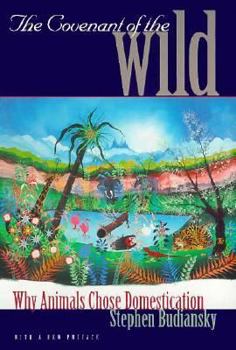The Covenant of the Wild: Why Animals Chose Domestication
Select Format
Select Condition 
Book Overview
Animal rights extremists argue that eating meat is murder and that pets are slaves. This compelling reappraisal of the human-animal bond, however, shows that domestication of animals is not an act of exploitation but a brilliantly successful evolutionary strategy that has benefited humans and animals alike. "Budiansky's slim, elegant discourse is a persuasive counterweight to the pastoral delusions of sentimentalists intent on seeing humans...
Format:Paperback
Language:English
ISBN:0300079931
ISBN13:9780300079937
Release Date:April 1999
Publisher:Yale University Press
Length:216 Pages
Weight:0.59 lbs.
Dimensions:0.6" x 5.5" x 8.2"
Customer Reviews
5 ratings
Thought provoking ideas about domestication
Published by Thriftbooks.com User , 21 years ago
Despite the other reviewers that dislike this book and the ideas presented in it, I found it fascinating. I have a suspicion that negative reviewers were people with an extreme animal rights philosophy (very different than animal welfare and often confused by the lay person). This book does not concentrate on modern animal agriculture or a defense of it (many aspects of which I do not like), but instead explores the process of domestication and the relationship between domestic animals and humans. Other reviewers comments that suggest Budiansky says things such as, battery hens _like_ to live in small cages, indicates to me that they did not get the point of this book. Budiansky doesn't suggest that animals like to be mistreated, he suggests that a strategy for a species to survive may have been to pair its fate with humans. If you want to learn more about the evolution of and scientific principles behind the strategy of domestication, you will find this book to be illuminating!
Science for the Lay Reader
Published by Thriftbooks.com User , 22 years ago
I found this a fascinating book with a wealth of information and arguments that are stated cogently. It is well-written and very readable. I have recommended it to many friends and given it as a present. I have read most of Mr. Budiansky's books (other than the code-breaking one) and, although I was not as happy with the second book and with the book about horses, I still found them good reading. Wth regard to the book about cats, a subject on which I have tried to do research, I found that his statement of facts and theories did, for the most part, jibe with those of serious researchers on the subject of animal behavior in general and cats in particular.
One of the best books I have ever read
Published by Thriftbooks.com User , 24 years ago
This is a magnificent book that takes into consideration virtually all of the latest scientific research into animal behaviour and the history of domestication, and then presents it in a way that is easy to assimilate. It should be compulsory reading for all those that profess to care about any species of animal, but most especially for those species that decided that their lifestyle would be easier if they joined up with human beings ; that is the domestic animals. I cannot help but use a cliche -it is like a breath of fresh air through the mass of anthropomorphic woolly thoughts which predominate when animals come up in conversation. Some of my best friends are vegetarian, but I would have even more respect for them if they read this book, thought about the arguments it raised, and then decided about their eating habits. The 'ahh' factor for fluffy bunnies and other cute animals is unscientific, and in the long run a destuctive way of thinking about other species. Read this book for the closest approximation to the truth in print.
great book on the relationship between animals/humans
Published by Thriftbooks.com User , 25 years ago
A must for all biologists and anybody else interested in learning more about the domestication process, why some species have become adapted to a life with humans and some not.
Thought provoking contribution to a contentious issue.
Published by Thriftbooks.com User , 26 years ago
Budiansky, standing nearly alone among the many works on the ethics of human to animal relationships, sees domestication not as an unnatural evil, forced upon animals, to our benefit and their detriment. In a refreshing view of the world he does not apologize for domestication, but attempts to show that it is neither unnatural, forced, nor lacking in benefits for non-human animals. Furthermore, he calls into question many of the fundamental world views held by popular authors who hold that domestication is morally wrong. Budiansky may not have everything right, but this book is a much needed perspective in the debate of animal rights and human welfare. I strongly recommend it.






